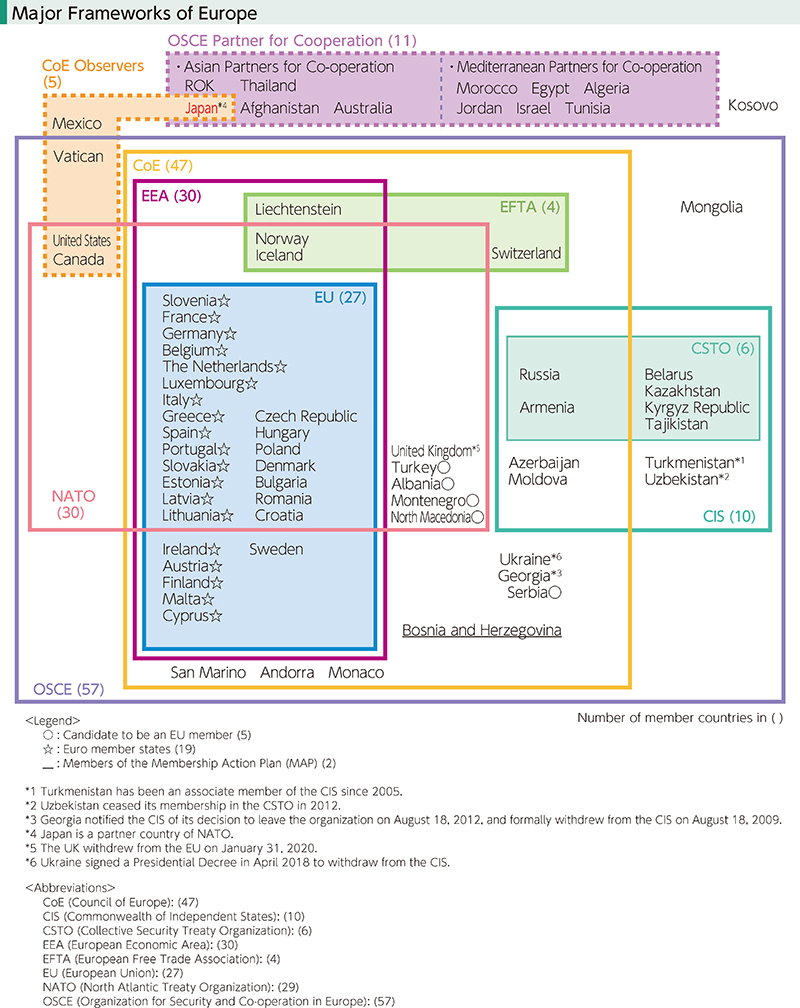Diplomatic Bluebook 2021
Chapter 2
Japan's Foreign Policy by Region
3 Collaboration with European Regional Institutions, and the Asia-Europe Meeting (ASEM)
(1) Cooperation with the North Atlantic Treaty Organization (NATO)
As a military alliance that aims at providing collective defense for its 30 member countries, NATO provides collective defense for its member countries, and also provides engagement in cooperative security efforts with non-EU countries and organizations and in crisis management outside of the region that could pose a direct threat to the security of the territories and peoples of NATO member countries, including security-keeping operations in Kosovo, support in Afghanistan, and counter-terrorism efforts. At the Meeting of NATO Ministers for Foreign Affairs held online in December, there were discussions on NATO's policy for 2030 as well as on Afghanistan, Russia and the situation concerning Asia. A statement by Foreign Minister Motegi was read out by Ambassador of Japan to NATO, stating that the security environment in East Asia today has become increasingly severe due to unilateral attempts to change the status quo, and that NATO is a reassuring partner for the FOIP vision promoted by Japan.
Japan and NATO are partners that share fundamental values, and both have been taking specific steps toward collaboration based on the Individual Partnership and Cooperation Programme (IPCP) (revised in May 2018 and June 2020), which was signed in May 2014. Japan has participated as an observer in NATO's crisis management exercises (CMX), as well as training exercises related to humanitarian assistance and disaster relief (HA/DR). Japan has also dispatched a female Self-Defense Force official to the NATO headquarters for the third time since November 2019 in order to promote Japan-NATO cooperation on cyber issues, women, peace and security (WPS) and other fields. Through the Partnership for Peace (PfP) Trust Fund, a project that aims to promote arms control and disarmament, as well as democratization and regional stabilization, utilizing NATO's specialized military expertise, Japan has also been providing support to process unexploded ordnance in Ukraine, and to help capacity building for demilitarization of Serbia's Ministry of Defense arsenal.
(2) Cooperation with the Organization for Security and Co-operation in Europe (OSCE)
OSCE is a regional security organization with 57 participating States across Europe, Central Asia, and North America, that works to bridge differences between member countries and foster trust through conflict prevention, crisis management, and post-conflict recovery and reconstruction in these regions through a comprehensive approach. Japan has taken part in OSCE activities since 1992 as an Asian Partner for Co-operation. Japan provides support for preventing terrorism by means such as strengthening border patrol in Afghanistan and Central Asia through the Border Management Staff College (a capacity building organization) in Tajikistan, and also gives support in conducting election monitoring as well as to the projects that promote women's social advancement. Considering that the OSCE plays an important role in improving the situation in Ukraine. Japan provides financial support to the OSCE Special Monitoring Mission (SMM) and intermittently dispatched experts to the SMM from August 2015. At the Council of Foreign Ministers meeting held online in December, State Minister for Foreign Affairs Uto Takashi issued a video message, stating that Asia and Europe need to share recognition of the security environment amidst increasing transnational threats, and that the OSCE's trust-building function plays an important role for such need. He also explained the severe security environment in East Asia, including the East China Sea, the South China Sea and North Korea, and introduced Japan's efforts toward realizing FOIP.
(3) Cooperation with the Council of Europe (CoE)
The CoE is an international organization comprising 47 member states in Europe. It has played a key role in establishing international standards in areas concerning democracy, human rights, and the rule of law. As the CoE's sole observer country in Asia, Japan has made active contributions to a range of CoE activities since it began participating in the organization in 1996. In the meetings on artificial intelligence (AI) held in July and December, university professors and expert government officials from Japan attended online and delivered keynote speeches and policy statements. In addition, Japan provided financial support for the meetings related to the Cybercrime Convention Committee held from November 30 to December 3 in the video teleconference format.
(4) Cooperation through the Asia-Europe Meeting (ASEM)
ASEM was established in 1996 as the sole forum for dialogue and cooperation between Asia and Europe. It currently comprises 51 countries and two institutions, and works through summit meetings, ministers' meetings, seminars, and other activities focused on three pillars, namely (1) politics, (2) economy, and (3) society and culture.
In September, a statement on COVID-19 by the foreign ministers of the ASEM host nation and regional coordinator countries1 was released. As an ASEM partner, Japan contributed to the discussions from the beginning, and the statement was a timely confirmation of cooperation for responding to COVID-19.
The 13th ASEM Summit was scheduled to be held in Cambodia in November. However, due to the global spread of COVID-19, a decision was made to postpone the meeting to June 2021.
The Asia-Europe Foundation (ASEF), ASEM's only permanent institution, is located in Singapore and is responsible for activities in the fields of society and culture, which is one of ASEM's pillars. In August, Mr. Morikawa Toru took office as the first Japanese Executive Director of ASEF (see the Special Feature on page 134).
Japan supports the ASEF's public health activities such as the ASEM Initiative for the Rapid Containment of Pandemic Influenza and works together with ASEF on emergency operations to provide ASEM partners with stockpiled items in order to respond to the outbreak of infectious diseases in their countries, as well as on workshops on capacity-building to tackle public health emergencies. In February, in response to the outbreak of COVID-19, Japan provided protective gowns, safety goggles, examination gloves, alcohol disinfectant and other supplies from the ASEF's stockpile to China, Cambodia, the Philippines, Laos and Mongolia.
Furthermore, taking into account that a rapid spread of COVID-19 or other diseases would have a significant impact on the Japanese economy and global economy, Japan decided to contribute approximately 5.7 billion yen to the ASEF for the Support Project for Prevention of Spread of COVID-19 and Other Diseases in ASEM Partners to stockpile medical use personal protective equipment (PPE) and antiviral drugs necessary for infection countermeasures and to provide them promptly upon request from ASEM partners.
In addition, Japan contributed to the activities of ASEM through cohosting with the ASEF Classroom Network Conference (October-December) online, and through the financial contributions to ASEF.
- 1 Cambodia (host nation), regional coordinator countries (EU, Germany (representing Europe), Singapore (representing ASEAN) and Russia (representing Asia except ASEAN))
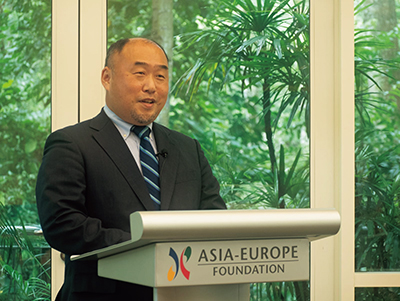 Executive Director Morikawa giving a speech at the seminar organized by ASEF
Executive Director Morikawa giving a speech at the seminar organized by ASEF(December 10, Singapore; Photo: ASEF)
The member states of the Asia-Europe Meeting (ASEM) extend over Asia and Europe, and their populations make up approximately 60% of the world's population, while they contribute to more than 50% of the global GDP. It is important to further strengthen not only economic relations, but also people-to-people exchanges and cooperative relations, between two such influential regions. The Asia-Europe Foundation (ASEF), was founded in 1997, the year after the inaugural ASEM was convened, as the sole permanent body of ASEM. It plays an important role in promoting mutual understanding extensively between Asia and Europe, and conducts exchange activities in a wide range of areas including culture, education, media, governance, environment, international health, and human rights.
The ASEF Executive Director and Deputy Executive Director are elected alternately from Asian and European member countries. In August, Mr. Morikawa Toru, a diplomatic official, became the first Japanese Executive Director of ASEF.
Around the same time, the spread of the novel coronavirus disease (COVID-19) placed severe constraints on people-to-people exchanges between Asia and Europe, raising questions about the future and ideal role for ASEF. The economies of all countries have been seriously impacted, and they could very well become inward-looking. This is precisely the time when it is vital for the people of Asia and Europe to revitalize exchanges and share wisdom in order to join hands to overcome this unprecedented crisis while harnessing their mutual individuality. While it has become difficult for the stakeholders to meet in person for many of ASEF's projects, ASEF is taking this opportunity to actively implement projects via online tools, and put creative effort into contributing to the further expansion and deepening of people-to-people exchanges between Asia and Europe.
Executive Director Morikawa holds a clear vision on the role and ideal state of the organization, and values universally applicable logic and a posture of respecting diversity. Ambassador Morikawa said as follows, “ASEF, which has been promoting various exchanges with ‘diversity' as a key word, is called upon to fully utilize what it has built up to date and fulfill its role as a common platform for exchanges between Asia and Europe. To that end, it faces the challenges of further promoting digital transformation for projects, which advanced rapidly due to the COVID-19 pandemic, expanding its networks with civil society, and strengthening collaboration with the ASEM process.” With this in mind, he is working tirelessly to strengthen ASEF's activities.
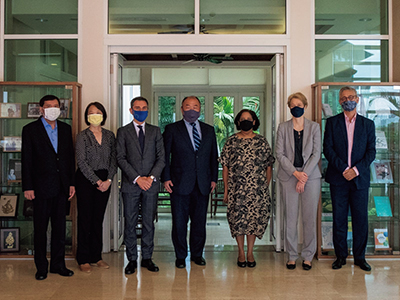 Photograph with participants of the seminar organized by ASEF (Center: Executive Director Morikawa)
Photograph with participants of the seminar organized by ASEF (Center: Executive Director Morikawa)(December 10, Singapore; Photo: ASEF)
ASEM celebrates the 25th anniversary of its foundation in 2021. We are facing a question of how to picture the world after the COVID-19 pandemic. As we move toward the reconstruction of this post-pandemic world, there are many challenges that Japan is expected to contribute toward through ASEF, including international health and medical care, climate change and other environmental issues, and human rights under the new social conditions. In these circumstances, Japan aims to contribute further to the expansion of exchanges between Asia and Europe in a wide range of fields. ASEF's activities are expected to be further strengthened under the leadership of Executive Director Morikawa, and Japan will continue advancing its cooperation with ASEF.
Other European Regions
Nordic countries
Denmark: In August, Foreign Minister Motegi held a telephone call with Foreign Minister Jeppe Kofod. They exchanged views on cooperation for various issues facing the international communi ty, including COVID-19 countermeasures, and concurred to deepen bilateral cooperative relations based on the Strategic Partnership between Japan and Denmark.
Finland: In November, on a foreign minister's telephone call, Foreign Minister Pekka Haavisto expressed to Foreign Minister Motegi his will to cooperate in realizing FOIP. They also shared the view to closely cooperate on issues facing the international community, including climate change and international health issues.
Norway: In November, Foreign Minister Motegi held a telephone call wi th Foreign Minister Ine Eriksen Søreide. They shared the view to strengthen cooperation in the areas of climate change a nd the marine environment, exchanged views on international cooperation in COVID-19 countermeasures, and confirmed to closel y cooperate in the international arena in light of Norway becoming a non-permanent member of the UN Security Council from 2021. In December, Prime Minister Suga held a summit telephone call with Prime Minister Erna Solberg. They confirmed cooperation for the High-Level Panel for a Sustainable Ocean Economy led by Norway and for COVID-19 countermeasures, as well as other cooperation in the international arena including the UN Security Council.
Sweden: In April, Prime Minister Abe held a summit telephone call wit h Prime Minister Stefan Löfven. They exchanged views on COVID-19 countermeasures, and confirmed close cooperation between Japan and Sweden.
Iceland: In May, Foreign Minister Motegi held a telephone call with Fo reign Minister Guðlaugur Þór Þórðarson, during which they exchanged views on COVID-19 countermeasures.
They also exchanged views on the promotion of women's empowerment and cooperative relations in the Arctic. They shared the view to further promote exchanges following the end of COVID-19 and to strengthen bilateral relations.
[Benelux countries]
The Netherlands: In May, Foreign Minister Motegi held a telephone call with Foreign Minister Stef Blok. They exchanged views on bilateral relations and the response to COVID-19. In December, Prime Minister Suga held a summit telephone call with Prime Minister Mark Rutte, in which they confirmed the strengthening of bilateral relations and cooperation in the international arena. Prime Minister Suga also welcomed the Netherlands' release of its own Indo-Pacific Guidelines, and the two leaders confirmed their cooperation in realizing FOIP.
Belgium: In response to the COVID-19 pandemic, an agreement was reache d among seven parties (the Dutch-speaking and French-speaking socialist, liberal, and ecologist parties as we ll as the Dutch-speaking Christian party), and the new cabinet of Prime Minister Alexander De Croo was formed on October 1. It to ok 493 days to form the cabinet after the general election in May 2019. In terms of relations with Japan, Foreign Minister Motegi held a telephone call with Foreign Minister Philippe Goffin in July, in which they exchanged views on the response to COVID-19 and cooperation in the international arena.
Luxembourg: In May, Prime Minister Abe held a summit telephone call with Prime Minister Xavier Bettel, in which they shared the view to continue rules-based international cooperation on the r esponse to COVID-19. In addition, Prime Minister Bettel expressed his hope that the Olympic and Paralympic Games Tokyo 2020 would show victory over COVID-19, and they shared the view to further develop bilateral relations going forward.
Andorra: In commemoration of the 25th anniversary of the establishment of diplomatic relations between Japan and Andorra in 2020, Foreign Minister Motegi and Foreign Minister Maria Ubach Font released a joint document on strengthening bil ateral relations in December.
Portugal: In August, Prime Minister Abe and Prime Minister António Luís Santos da Costa exchanged messages to commemorate the 160th anniversary of the signing of the Peace, Friendship a nd Trade Treaty between Portugal and Japan in 2020. In September, Foreign Minister Motegi visited Portugal as a Japanese Foreign Minister for the first time since 2002. Foreign Minister Motegi and Foreign Minister Augusto Ernesto Santos Silva shared the view to f urther strengthen bilateral relations on the occasion of the 160th anniversary of the Treaty.
Malta: In September, the Embassy of Malta was opened in Tokyo and Am bassador André Spiteri was appointed as the first Maltese Resident Ambassador in Tokyo.
[Baltic countries]
Latvia: Japan and Latvia concurred to hold commemorative events in 2021 to mark the 100 years of friendship between Japan and Latvia.
Lithuania: In commemoration of the 80th anniversary of the activities of former Vice Consul Sugihara Chiune, who saved many lives by issuing visas to Jewish people to pass through Japan, Lithuania designated 2020 as “the year of Chiune Sugihara” and held vari ous commemorative events in cooperation with Japan. On the occasion of the “Beyond Duty - Visas for Life,” a high level diplomatic event, held by the Government of Lithuania in Kaunas in September, Foreign Minister Motegi issued a video message expressing his desire to cooperate with the international community to protect a peaceful and prosperous society in the midst of the global spread of COVID-19. The two countries also concurred to hold commemorative events in 2022 to mark the 100th anniversary of friendly bilateral relations.
Estonia: In February, Prime Minister Abe held a summit meeting and din ner banquet with Prime Minister Jüri Ratas during his visit to Japan. They exchanged views on bilateral relations, including strengthening economic relations and cyber cooperation, as well as on cooperation in the international arena and regional situations. A ceremony for the exchange of three memoranda of cooperation between Japanese and Estonian companies was held with the two leaders in attendance. In May, Foreign Minister Motegi held a telephone call with Foreign Minister Urmas Reinsalu, in which t hey exchanged views on bilateral relations and cooperation in t he UN Security Council. In addition, Japan and Estonia concurred to h old commemorative events in 2021 as the 100 years of bilateral friendship.
Ireland: In November, Foreign Minister Motegi held a telephone call with Minister for Foreign Affairs and Defence Simon Coveney, in which they shared the view to closely cooperate in the inte rnational arena in light of Ireland becoming a non-permanent member of the UN Security Council in 2021-22. Minister Coveney also expressed his intention to cooperate with Japan in the process of future discussions on the Indo-Pacific in the EU.
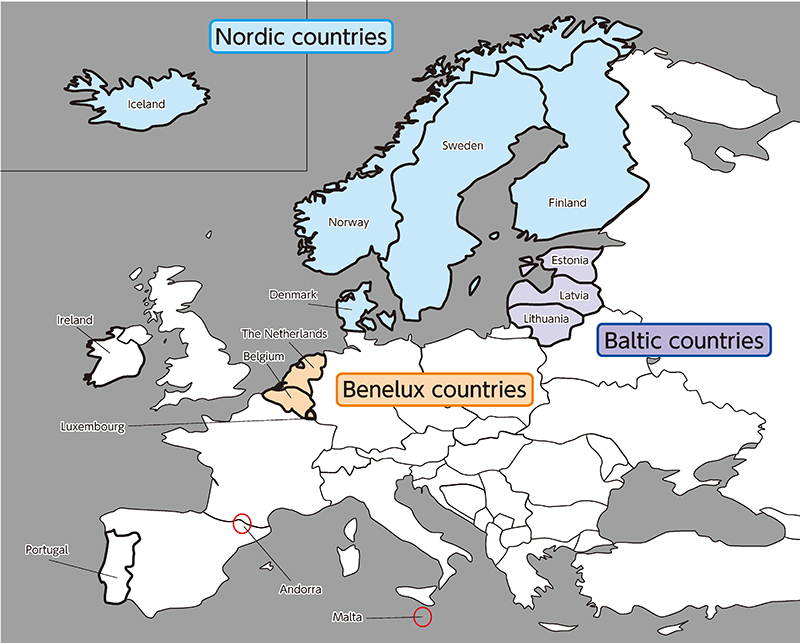
[V4]
Bilateral relations between Japan and the Visegrád Group (V4) h ave a long history and are traditionally friendly. Japan places emphasis on its cooperative relationship with the V4 regional c ooperative framework of the four countries of Poland, Hungary, Slovakia and the Czech Republic, which share fundamental values and are increasing their presence in Europe against the back - drop of steady economic growth. Japan and the V4 are closely cooperating even amidst the spread of COVID-19 through online seminars and other means.
Poland: In January, Prime Minister Abe held a meeting with Prime Mini ster Mateusz Morawiecki, who was visiting Japan. In April, Foreign Minister Motegi held a telephone call with then Foreign Minister Jacek Czaputowicz following the repatriation of about 150 Japanese nationals aboard a chartered Polish Airlines flight amid the spread of COVID-19. Poland assumed the V4 Presidency in July. The year 2020 marked the 100th anniversary of the r escue with Japan' s cooperation and arrival in Japan of Polish orphans who had been left behind in Siberia, and related events and publicity were conducted.
Hungary: In May, Foreign Minister Motegi held a telephone call with Minister of Foreign Affairs and Trade Péter Szijjártó. They confirmed the significance of Prime Minister Viktor Orbán' s visit to Japan in December 2019. They also confirmed their intention to follow-up on matters agreed on in that meeting, thereby steadily advancing bilateral relations.
Slovakia: In 2020, Japan and Slovakia celebrated the 100th anniversary of relations , with various commemorative events were held in both countries (see the Column on page 130).
Czech Republic: The Czech Republic held the V4 Presidency until June. In 2020 , Japan and the Czech Republic celebrated the 100th anniversary of bilateral exchanges, with various commemorative events held in both countries (see the Column on page 130).
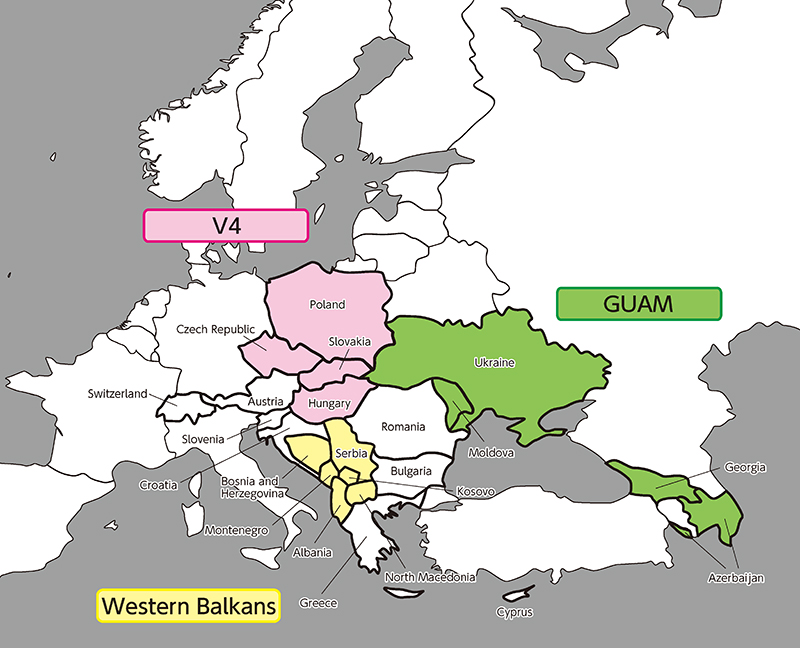
[The Western Balkans]
Although there still remains ethnic divisiveness, overall progress can be seen for stability and development in the Western Balkan region owing to each country's commitment to reforms toward European integration. Prime Minister Abe visited Serbia in January 2018, the first visit ever by a Japanese Prime Minister. During the visit, he announced the Western Balkans Cooperation Initiative designed to advance cooperation with the Western Balkans (Albania, Bosnia and Herzegovina, Kosovo, Montenegro, North Macedonia and Serbia), which aims for EU membership. Japan has prom oted cooperation with the entire Western Balkan region in areas such as youth and economic exchanges. In February, Japan held the Civil Society Summit in cooperation with the Western Balkans Fund in Albania' s capital city of Tirana, with participants from countries throughout the Western Balkans.
[GUAM (Georgia, Ukraine, Azerbaijan, Moldova)]
GUAM was established by four countries of the former Soviet Uni on to promote democracy and stable economic development. Japan established the “GUAM+Japan” cooperation framework in 2007. Through holding foreign minister-level and vice-minister-level meetings, as well as theme-based workshops with professional s and experts from GUAM countries invit ed to Japan, Japan places importance on ensuring that fundamental values take root in the international community through the stability and economic development of GUAM countries.
Ukraine: The Second Japan-Ukraine Cybersecurity Consultations were held in January. President Volodymyr Zelenskyy, who was inaugurated in May 2019, continues to make efforts to resolve th e situation concerning eastern Ukraine and the Crimea issue through negotiations in the framework of the Normandy Format and other means. Based on its consistent position of respecting Ukraine' s sovereignty and territorial integrity, Japan continues to promote bilateral cooperation and support domestic reforms for Ukraine.
Slovenia: Japan-Slovenia relations have gained momentum due to former Foreign Minister Kono' s visit to Slovenia in 2019, which was the first by a Japanese foreign minister, and President Borut Pahor's subsequent visit to Japan. Economic relations have also developed in recent years, including the holding of the Japan-Slovenia Business Seminar in Tokyo in February. It is expected that bilateral relations will make further progress toward the 30th anniversary of the establishment of Japan-Slovenia diplomatic relations in 2022.
Romania: A Japan-Romania Foreign Ministers' telephone call was held in October. They confirmed to strengthen cooperation toward the 100th anniversary of the establishment of Japan-Roma nia diplomatic relations in 2021, as agreed upon during the visit to Japan by President Klaus Iohannis in October 2019.
Bulgaria: Since Prime Minister Abe became the first Japanese Prime Minis ter to visit Bulgaria in January 2018, there has been an increase in mutual visits by dignitaries in recent years, including reciprocal visits by the foreign ministers and the visit to Japan by President Rumen Radev during the “Triple anniversary” in 2019 (the 110th anniversary of the beginning of bilateral contacts, the 80th anniversary of the establishment of diplomatic relations and the 60th anniversary of the resumption of diplomatic relations). Cooperation under the “Western Balkans Cooperation Initiative” is being advanced.
Croatia: In July, Foreign Minister Motegi held a telephone call with Foreign Minister Gordan Grlić Radman. Foreign Minister Motegi congratulated Croatia on its leadership in holding the EU Presi dency in the first half of 2020, and they confirmed to steadily develop bilateral relations, including in the economy field.
Austria: In September, Prime Minister Abe held a telephone call with Chancellor Sebastian Kurz.
Switzerland: In November, Foreign Minister Motegi held a telephone call with Foreign Minister Ignazio Cassis, in which they agreed to further expand exchanges between Japan and Switzerland on the occasion of the Olympic and Paralympic Games Tokyo 2020.
Greece: In January, State Minister for Foreign Affairs Wakamiya Kenji held a meeting with Deputy Minister for Economic Diplomacy and Openness Kostas Fragogiannis during his visit to Japan, in which they agreed on cooperation for the success of the Olympic and Paralympic Games Tokyo 2020.
Cyprus: Continuing on from the opening of the Embassy of Japan in Cyprus in January 2018, the Embassy of Cyprus in Tokyo was opened. There are expectations for further strengthening of relations toward the 60th anniversary of the establishment of diplomatic relations in 2022.
